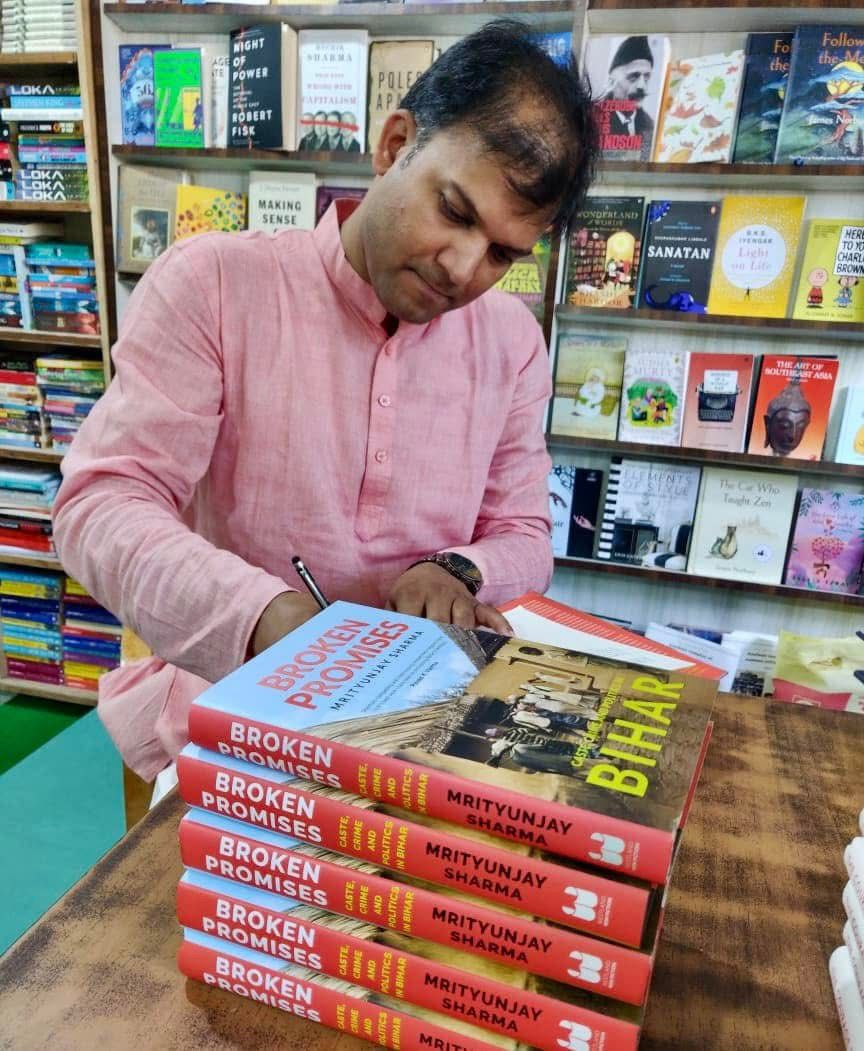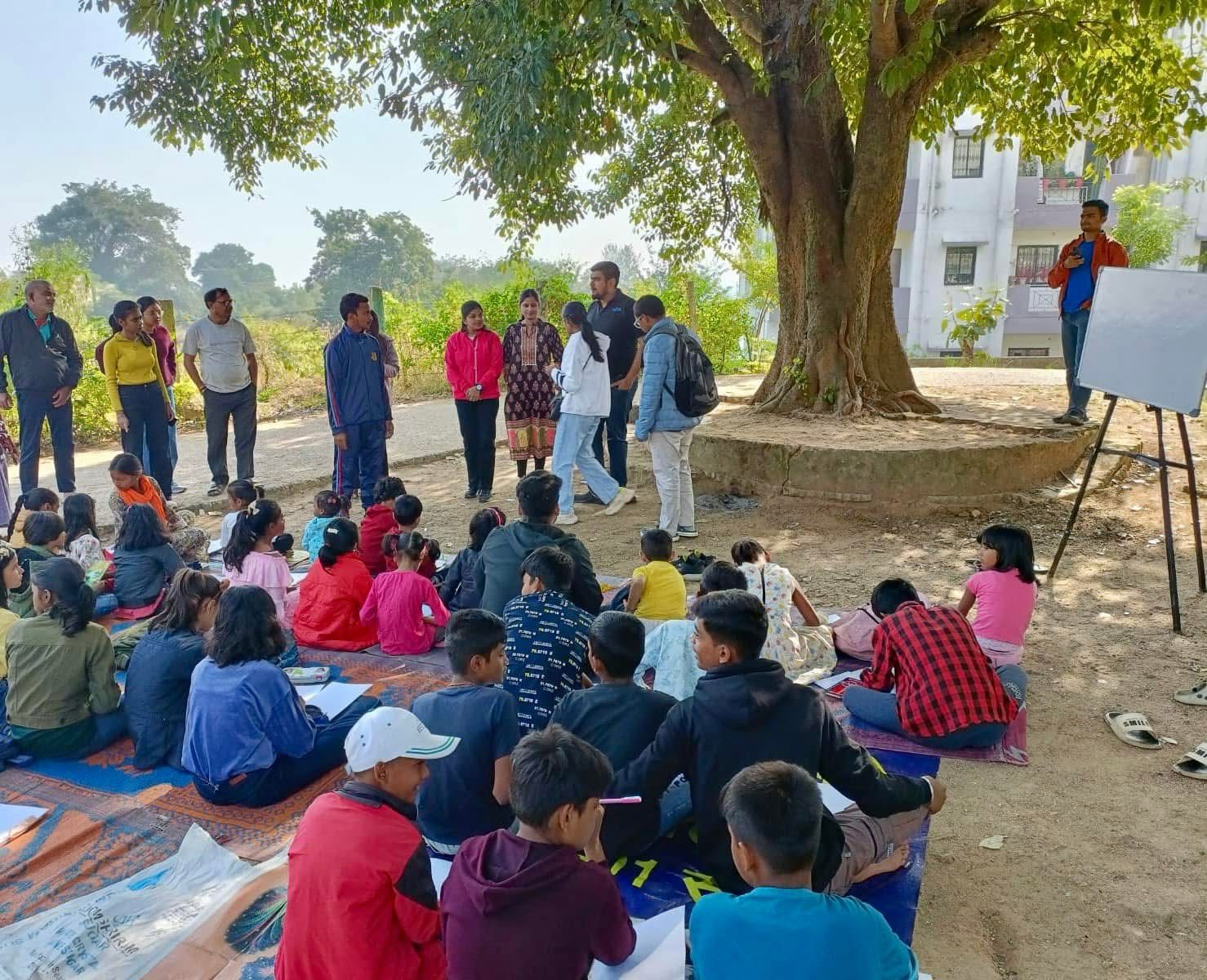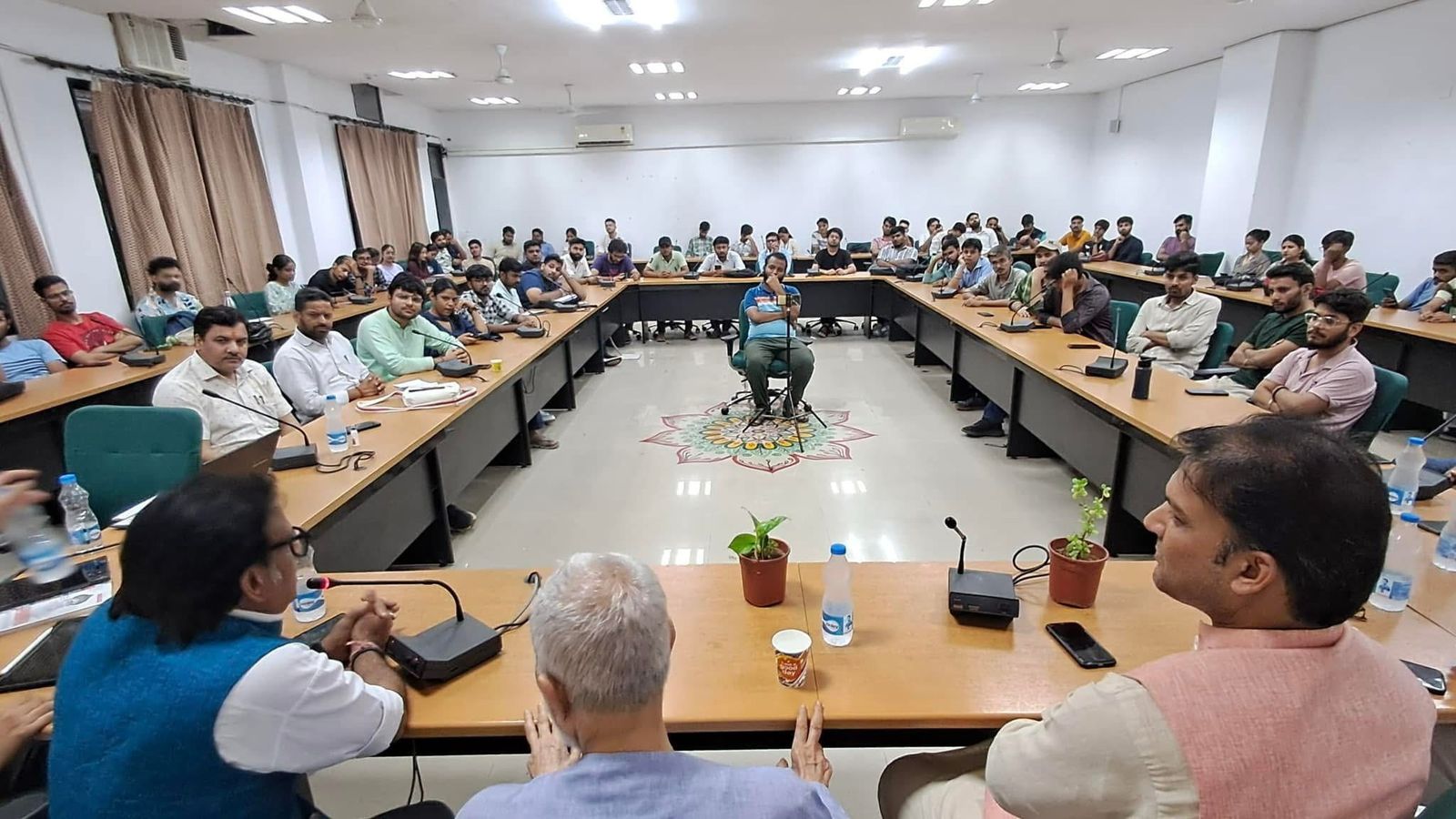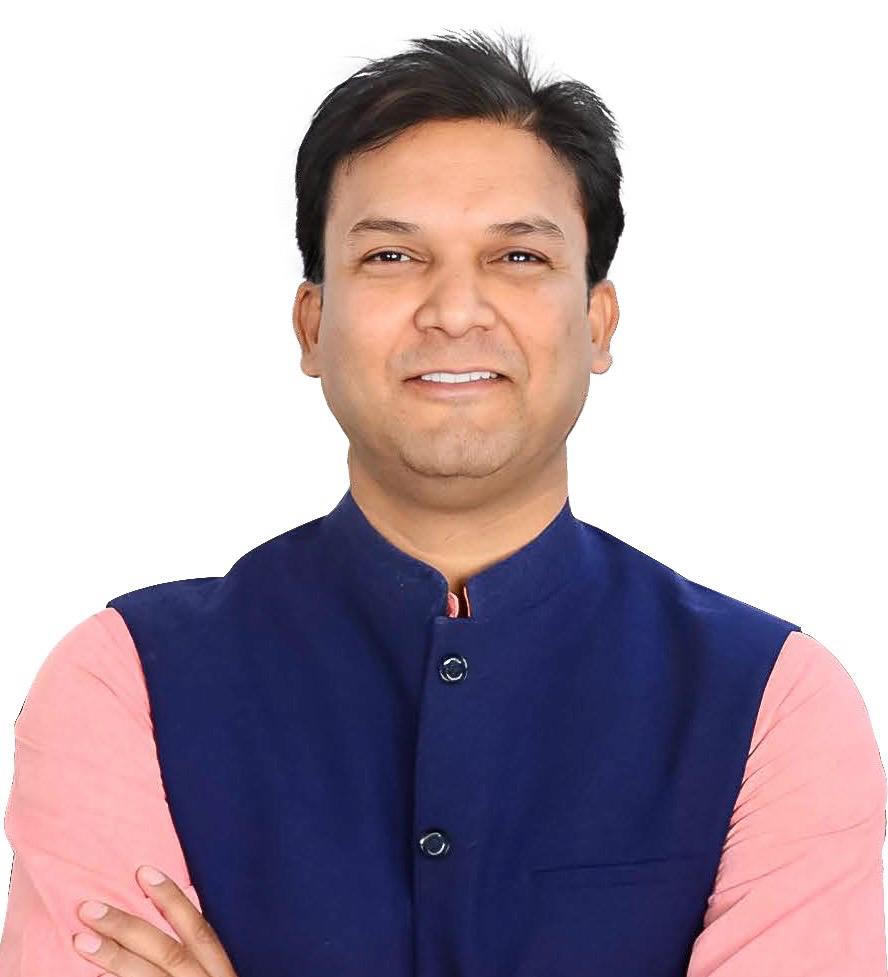An engineering graduate from BIT Mesra, Ranchi, and an MBA from XLRI Jamshedpur, Mrityunjay Sharma moved from the corporate corridors to the political province. Having worked in various senior HR roles, he moved to the hinterlands of Chhattisgarh, where he worked with the then-chief minister Dr Raman Singh on developmental issues. He subsequently moved to his home state of Jharkhand to join politics and work at the grassroots. He is currently the Convener - Election Management for BJP Jharkhand. Mrityunjay Sharma runs a social initiative called Kartavyapath to teach mathematics to underprivileged children, and he is the co-founder of Ranchi-based start-up ‘biofie.com’. He is a visiting faculty at several institutes, including the IIMs.
In an exclusive interview with Jyoti Jha; Sr. Editor, Today Magazine, Mrityunjay Sharma talks about the various aspects of Bihar & Jharkhand along with his book.
Q.1 How do you see your journey from Senior HR Professional to an author?
MS: Writing has never been my primary profession; it is a consequence of my passion for literature. Having steered my career path from HR to the Development Sector (Govt) and finally found my anchorage in Politics, I have always had a flair for writing that was more inclined towards short stories, poetry, etc. When I developed a more mature perspective in life when I had moved to Chhattisgarh and had a chance to observe, understand, and analyze the political scenarios, I began to develop an introspect that was absent while I was working in the corporate world disconnected from these aspects of our life. Coming from a place that has suffered through decades and has seen a great decline in its rich heritage, culture, and development, especially in a particular phase, that is disheartening and yet compelling to decipher, I took it as a responsibility to write about it. I could hardly find detailed documentation of that period and hence abiding by the saying, ‘If you can’t find a book you want to read, then you write it’, I commenced my journey as a writer and author.
Q.2 Being an Engineering graduate from BIT Mesra and an MBA graduate from the highly prestigious XLRI, Jamshedpur, what motivated you to serve the country as a politician?
MS: My path to corporate was a straight walkway of a middle-class upbringing with common set goals. However, I always had the clarity deeply seated in my mind that corporate was not my cup of tea. I believe that to be able to contribute to society in a certain way with a particular impact, the power of politics is the right channel. Lacking any structured goal in this direction at that time, I continued with my momentary objectives in the corporate career. I also believe that tossing aside an assured career simply to plunge into the unknown and uncertain waters of passion, is not a great choice. I landed an opportunity to join a fellowship program in the Chief Minister’s office which I found to be immensely progressive and enriching and that built my confidence to explore my path in politics later. I always had my ideologies inclined towards the central government and its party, and I gladly became a part of the process for positive change through my endeavors in the political domain from my hometown Ranchi where I joined the BJP office. Being an outsider with no political background offered me uncertainties and challenges, however, I managed to overcome them in a way that streamlined on its own as if I was destined to be here and belong here. Since then, I have considered politics to be my primary profession.
Q.3 What is the role of authors in being a catalyst for any change?
MS: Not emphasizing that politics is the only medium for bringing any change, I still believe that to drive any larger changes at societal, narrative, directional, economic growth, and policy levels, it is still a more impactful channel with broader prospects. Although there are other mechanisms of change like for example, Kailash Satyarthi’s move. If we speak of literary vehicles, authors are artists with a medium of expression to present truth, reality, or fiction, through their perspective. Their role is crucial in a way that they should responsibly present the facts in the most unbiased manner clearly and comprehensively that is easy for the readers to understand and grasp. We tend to forget our history, hence these writings should be documented as a source of reference for future generations, inspiring them to keep up the momentum of positive change and overcome the adversities that the times have faced.
Q.4: As per popular belief, students from Bihar are good at mathematics. How is your social initiative ‘Kartavyapath’ is helping to boost that indigenous talent?
Kartavyapath started as a very small Sunday activity where I used to teach a few underprivileged children in the neighborhood. Gradually the group expanded with 5 centres and about 200 students at present. Mostly children require good guidance in Language and Maths to build their passion and path around it. We believe that numerical capabilities in children help boost their confidence, hence we focus mainly on Maths. Bihar has a pool of children with exceptional mathematical skills and numerical capabilities, but it is mostly taken in overconfidence I believe. A certain segment may be excelling in the subject but the rule doesn’t apply to all. We should feel happy about it but also get out of the ‘self-praise’ mode. The aim should be to provide skill-based training and education to children rather than burdening them with academic overloads. They should be able to use their education to apply in their lives and succeed. Other states have enough opportunities in private sectors hence there is no life-and-death situation to prepare for Administrative services like in Bihar. Startup Culture, Skill-based Education, and Service Sector are the ways to combat disguised unemployment.
Q.5: How is Biofie defining the HR landscape which has already some giant players?
MS: Biofie is a startup that was initiated when I came back to my hometown Ranchi in the year 2019. Politics is a platform that doesn’t generate income, to sustain myself financially, I started this organization, the very first initiative of its kind that helped create video-based resumes for candidates seeking job opportunities and career options. The idea was to present the candidate as a person beyond their accomplishments and accolades as specified in the text resumes. The video resume showcases the entire personality of an individual so that the employer gets to know and understand the person better. This tremendously helps in the process of first-level screening of profiles and we have managed to have a wide base of clientele including MNCs, HR Companies, etc. This startup is a natural extension of my career path and passion.
Q.6: As an entrepreneur what do you find the possible reason for not having any unicorns from Bihar & Jharkhand in recent times?
MS: There is an extreme talent pool in Bihar that outshines when those people showcase their skills outside Bihar. They excel in their field in other states, but back in their home state, they succumb. Industries and Startups are all about an ecosystem and not an individual or an idea, it is not a linear process. It is about creating a favorable ecosystem over the years for the industrial sector to grow and flourish that overcomes challenges at various stages, right from Bureaucratic hurdles during incorporation to getting cold shoulders from the office bearers at every step or finding the right talent pool for the setup. Apart from the ease generated through the digitalization of certain aspects, wherever there is human interaction, there are enough hurdles and challenges for a person. The role of the government becomes important here to create a conducive environment for ideas to thrive and Startups to sustain. There should be good and favorable startup policies, creating incubation centers, providing incentives to the entrepreneurs, and all with a systematic and facilitative law and order. The image of Bihar with ‘lawlessness and corruption’ needs to change for people within and outside the state to come and venture into entrepreneurship and startup revolution. Unless this is achieved, there will be pocket successes but a larger state-level or societal level change is difficult to attain.
Q.7: What does ‘Broken Promises’ have to offer for the readers of Bihar & Jharkhand as we are aware of the situation and surroundings of our states?
MS: Non-fiction is based on publicly available facts; hence I have not presented any facts and data in the book that is only known to me. Newspapers, magazines, books, interactions, a few experiences, etc. have been my source of data and fact collection. For this subject, one would find several books, but each one would have its own style, perspective, pattern, and presentation technique with unique central themes. The period that I have portrayed in my book is beyond the sporadic storytelling of certain highlighted events during the time that is known as ‘Jungle Raj’. I have shown the outcome of something that is not confined by only a few events in the period, but the impact and analysis of the problems and downfall of Bihar during that time. The central theme of my book is that particular period, but everything around it involves a deeper understanding, analysis, and outcome of the time. Beyond the superficiality of events and their narratives, I have tried to deeply dive into the underlying problem areas and their detailed analysis. ‘Why did Bihar go through what it went through”, it is a reminder for the people and generations that we should prepare not to spiral back in that tumultuous time and move ahead with progression, positivity, and development.
Q.8: How can Women's Empowerment be supported to ensure the important role of women in the overall growth and development of society, state, nation, and globally?
MS: The straightforward formula to empower women is to make them financially independent where they are capable of making their own decisions and building a life around that. Financial independence automatically includes education, skill development, equal opportunities, etc. Apart from the spaces where entry barriers are high and there’s a need for building enabling mechanisms, women would be capable of otherwise living a more fulfilling, successful, and happier life with financial independence and decision-making capabilities in every other aspect of life. For example, since the political representation of women is very poor, the policy of panchayat Reservation for women was an encouraging change. Once the women are aware and equipped with independence and self-sustaining skills, they become more impactful in leadership roles. Although this is all going to be a generational change, it is gradually achievable.
Q.9: Any future literary projects that your readers should look out for? Your words of wisdom to the youth to succeed in life.
As of now, nothing is finalized yet because of the professional engagements, however, I am working on bringing out the Hindi edition of ‘Broken Promises’ on large public demand. I want to write more but as and when ideas are generated and time permits, they will be put to motion.
I still consider myself to be the young generation, and having said that, I’d say that every individual has their unique path and journey, so if you feel passionate towards a goal either subconsciously or consciously, you should venture into that but be mindful and take measured steps with a sense of responsibility. Experience, explore, feel, measure, assess, and then move ahead gradually with awareness and caution. Transition slowly and then delve deeper into the path. Eventually do things that make you happy in life, but always have the financial security.






